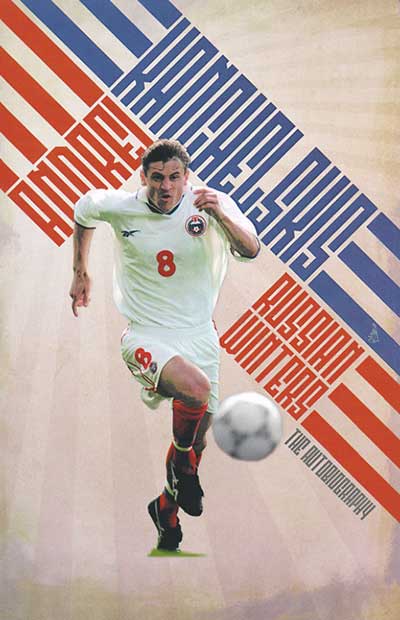
De Coubertin Books, £20
Reviewed by Jonathan O’Brien
From WSC 370, December 2017
Buy the book
Andrei Kanchelskis was one of the 13 foreign players who lined up on the opening day of the first Premier League season in August 1992. He was easily the most exotic of them: a Soviet/CIS international of Lithuanian parentage who came from Ukraine. More than 20 years since he left, he’s still the only Russian player to have truly hit it big in England. Why did it only happen for him and nobody else? We don’t quite find out in this intermittently interesting but slightly insubstantial autobiography.
The opening chapter is basically a polemic on contemporary Russian football ahead of the 2018 World Cup, which is a strange way of kicking off one’s memoirs. Things finally get going when Kanchelskis moves onto his childhood and adolescence, which coincided with his homeland breaking apart around him. The insanity of the late 1980s was best summed up for him when he got offered 100,000 roubles for a car which had cost him 16,000. “There was money everywhere, just nothing to spend it on,” he writes. Called up for national service, he narrowly avoided being sent to the war zone of Nagorno-Karabakh in 1988. Instead, he did a lot of non-football shooting at a military academy, where “I learned to love the Kalashnikov”.
Kanchelskis’s golden years were the four he spent at Manchester United, where his flashing runs along the right wing helped them win two titles, an FA Cup and a League Cup. He got better for United the longer he stayed there, finishing as their top scorer in 1994-95. Then, suddenly, he left for Everton in a transfer that surprised everyone, perhaps even himself. Rumours swirled that he was owned by the Russian mafia and had vast gambling debts to pay. His own explanation here is that his agent was feeling heat from Shakhtar Donetsk, his old club, to engineer a transfer because they would get a large cut of the fee.
Everton themselves soon cashed in on Kanchelskis, selling him to Fiorentina – where he broke his ankle and flopped. Signing for Rangers, he fell out with Dick Advocaat, whom he accuses here of being money-obsessed and managerially unimaginative. By the turn of the century, the searing pace that had made him such a killer was gone forever. One final payday, in Riyadh, left him open-jawed at the drinking habits of the Saudi royals he encountered. “It was a country where everything happened at night,” he writes.
There are several dozen intriguing nuggets like this in Russian Winters. But while the book is tidily written it’s slightly bland (this may be more a reflection of Kanchelskis’s personality than of the ability of his ghostwriter, Tim Rich), and it doesn’t always feel like a cohesive story, carrying a strong air of “this happened, then this…”. Still, it’s not bad, and much of it is like sifting through a time capsule, even though Kanchelskis only retired in 2006. He may have been at Manchester United for the first few glory years, but it was a very different club from today’s billion-pound beast – his first contract at Old Trafford earned him £120,000 a year, only 20 grand more than Jesse Lingard now makes in a week.